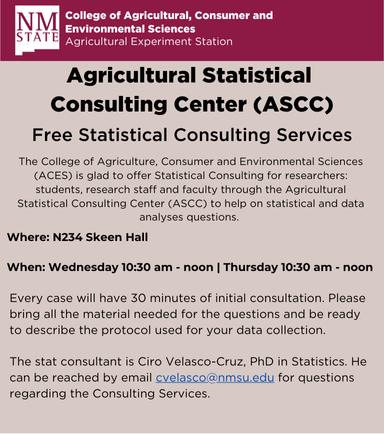Agricultural Statistical Consulting Center | ASCC
“All models are wrong, but some are useful.” - George Box (1976)
Mission
The Agricultural Statistical Consulting Center (ASCC) is committed to helping the ACES community with their day-to-day needs for study design and data analyses, based on appropriate, sound, and cutting-edge statistical procedures and models. We aim to work hard as a reliable and accessible source of statistical techniques needed to elucidate and objectively answer research questions and hypotheses. We partner with our scientists and students in their scientific advances and discoveries, assisting in translating findings to useful and better agricultural practices. We are convinced that our collaborations with ACES’s scientists will contribute to the rigor of ACES research. This research is aimed at reducing and mitigating negative environmental impacts of agricultural practices and increasing food quality and abundance to sustainably satisfy human food needs. We believe in and work toward a better and more fulfilling future for our generation and those who will follow us.
Scope
The ASCC provides research design assistance and statistical analyses of experimental and observational data in support of research and discovery within the ACES community and their collaborative partners. We are a team of experienced Data Scientists building and adapting models to understand and learn from the data, answering questions regarding inferences or predictions; all within the statistical learning perspective. The Center can help ACES research partners at different stages of their research and career: from experimental planning and establishing, to data collection, analysis, and interpretation of the data. Researchers working with ASCC statisticians are encouraged to include the ASCC as a collaborator on grants.
Here to Help
The statistical consulting center can offer the following types of services right away, as well as consulting on a variety of other statistical approaches appropriate for agricultural and biological data.
Types of assistance provided to scientists in ACES:
- Experimental design and analysis
- Analysis of observational data
- Grant proposals: constructing and composing appropriate and efficient statistical procedures for data collection, data analyses, and validations
- Writing sound statistical descriptions for scientific reports and manuscripts.
- Statistical analysis for scientific manuscripts
- Summarizing results into effective tables, graphics, and figures
- Training on statistical methods for non-statisticians
Frequent topic areas:
- Linear/Non-Linear Regression, with time varying regression coefficients
- Bayesian and classical Analysis of Variance (BANOVA and ANOVA), for crossed and nested experimental designs
- Fixed, Random and Mixed models
- Ordinal, Nominal and Count data modeling
- Non-parametric Regression
- Multivariate Analysis
- Variable Selection in Regression Models
- Spatial Statistics
Get Started
Consulting services are currently offered by appointment and certain walk-in hours. Please contact ASCC via email (listed next to personnel) to set up an appointment during the academic year.
Walk In Hours

Talk to An Expert
 |
Ciro Velasco-CruzTitle: Research Assistant Professor, Extension Plant Sciences Office Phone: 575-646-5280 To schedule an appointment with Dr. Velasco-Cruz, email him at: cvelasco@nmsu.edu |
Dr. Velasco-Cruz is a statistician proficient in classical and Bayesian statistics, with proven experience in statistical consulting, scientific collaborations, research, and teaching. Although he applies statistics to a wide variety of topics, his current research focuses on modeling biological and agricultural data, by applying and adapting the following topics.
- Spatial Statistics
- Dynamic Linear/Non-Linear models
- Latent Variables and Hidden Markov models
- Non-parametric Bayesian analyses
- Bayesian Variable Selection methods
- Supervised/un-Supervised Learning and Classification methods.
- Graphical models.
- Dimension Reduction methods
The above listed topics can be applied to analyze a myriad of data types. Data collected periodically at different locations can be analyzed using combinations and variations of topics 1 and 2. To identify the most important covariates to explain variability on a response variable, for inference or prediction, topic 5 is ideal. Topic 8 is a useful technique for biological data for genetics and genomics data, alleviating some complexities associated with multidimensionality. For modeling classification variables, such as those used to indicate degrees of disease progression, product quality, or to rate species’ tolerance to infections or abiotic stressors, topic 3 is appropriate.
Dr. Velasco-Cruz's data modeling approach aligns with current Data Science. Assuming every dataset is unique, my process of statistical learning and insight includes a model-building step to combine the information contained in the data and the expert’s knowledge. These models lead to more interesting and often productive results. This approach enhances scientists’ understanding of their research topics and can lead to new insights and more robust conclusions. Thus, research efforts are refined and clarified, defining the direction of next steps, with new hypotheses and questions, toward discoveries.He uses SAS, R, Matlab, and SAS-JMP for standard data analyses, and for large data sets and/or tailored analyses, the combination of C++ and R has proven effective and most efficient.
